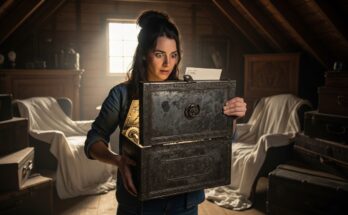The airport was a blur of noise and chaos, a symphony of a thousand different voices. Julian, a high-powered CEO, was a man who lived his life by a strict set of rules. He was never late, never disorganized, and never, ever, showed weakness. He was in a hurry, running late for a flight, when he saw her. A young woman, a woman who was a whirlwind of disorganized chaos, was struggling to get her large, overstuffed suitcase onto the conveyor belt at the security checkpoint. He watched, a sneer forming on his face, as she fumbled with the bag, her hair a wild, unruly mess. He approached her, his voice a low growl. “You’re holding up the line,” he said, his eyes filled with a cold, unforgiving anger. “Get a grip, and get out of my way.”
The woman, a travel writer named Clara, looked up, her eyes filled with a quiet dignity. “I’m sorry,” she said, her voice soft. “I’m just trying to get my bags through.” She then looked at him, her eyes filled with a quiet pity. “You should be more kind,” she said. “You never know when you might need it.” Julian, feeling a sense of self-righteous satisfaction, walked away, completely forgetting the brief, unpleasant encounter.
Hours later, Julian was in the air, his private jet soaring through the clouds. He was in a meeting with his board, presenting a new business venture. Suddenly, his vision blurred, and a searing pain shot through his chest. He collapsed, clutching his chest, the room a spinning vortex of fear and confusion. He was having a massive heart attack. The flight crew, trained in emergency medical procedures, rushed to his side, but it was clear that his condition was rapidly deteriorating.
Clara, who was a passenger on the same flight, had been sitting in the back, working on a new article. She had seen the commotion and had come to the front, her face a mask of quiet concern. She was a trained nurse and had a small, portable defibrillator in her carry-on bag, a device she had purchased after a family member had a heart attack. She saw Julian’s condition, saw the fear in the eyes of the flight crew, and knew what she had to do. She worked quickly, her hands steady and sure, and in a matter of minutes, Julian was stabilized.
When he awoke, he was in a hospital room, surrounded by his family. He was told about the woman who had saved his life, the woman who was also on his flight. He was told about her skill, her professionalism, and her quiet heroism. He didn’t know who she was, but he knew he had to find her. He called his assistant, who, with a few clicks of a button, found her. He went to her studio, a small, cluttered space filled with art and love, and he saw the painting he had so carelessly dismissed. He saw the kindness in her eyes, and he knew he had to apologize. He did so, and his apology was not about the money, but about the profound, humbling lesson he had learned.


